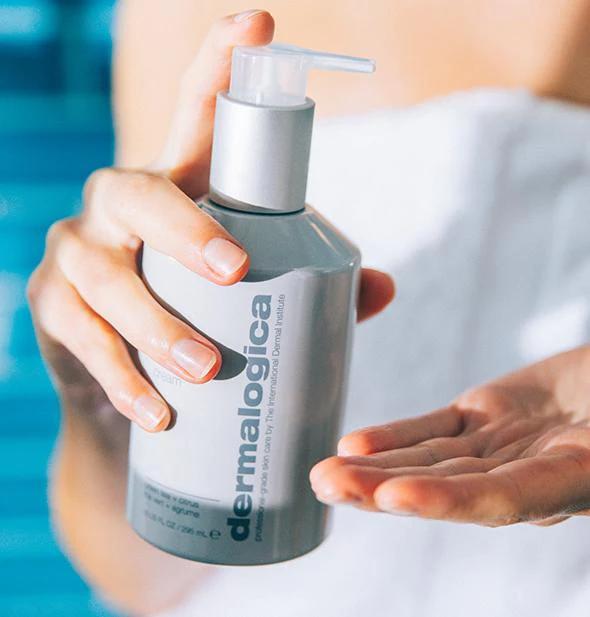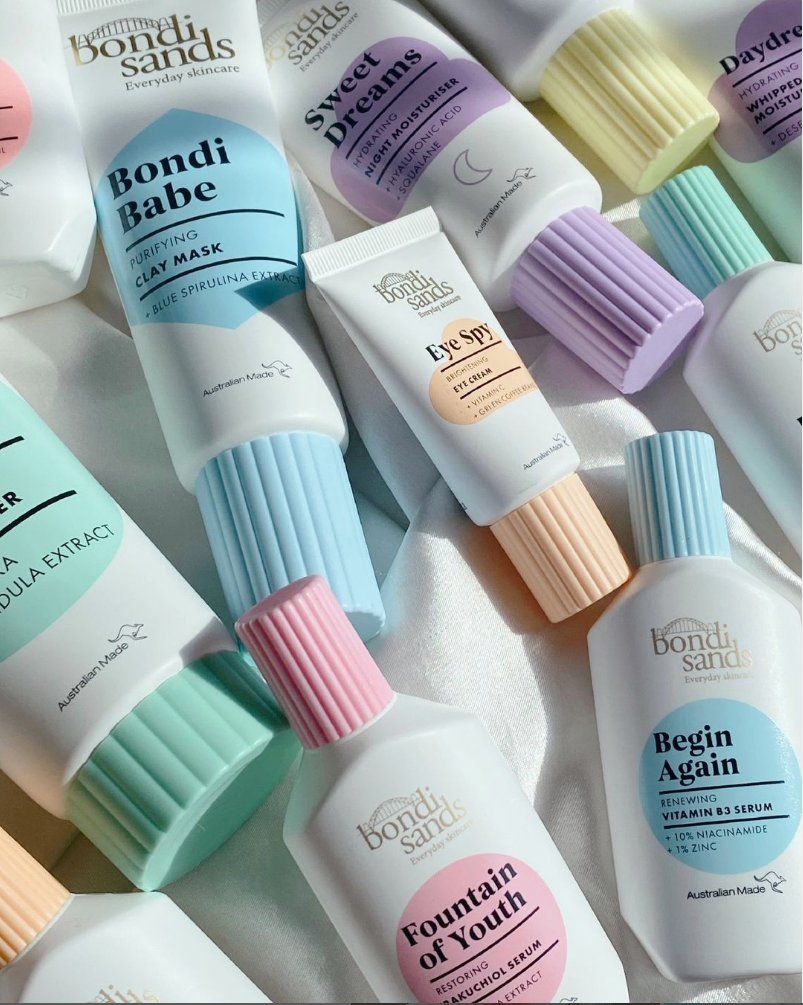Case study: building an iconic brand with Dermalogica

We sat down with our friends at Dermalogica to talk about how they maintain their strong brand presence in an increasingly crowded industry.
- Dermalogica CMO Michiel Tops uses Tracksuit to measure and strengthen brand positioning. Tracksuit data shows that in AU, Dermalogica is perceived as 'innovative', 'scientific', and 'modern'.
- Michiel also uses it to get an overview of consumer behaviour in the skincare category, with 8.6 million women in Australia claiming they've purchased premium skincare in the last 12 months.
- By using Tracksuit to track a group of brands in a crowded category, he can get insight into new players who are growing. This helps avoid any blind spots: "We're now shifting our focus and starting to look in other directions as well. It's a highly competitive landscape," Michiel says.
If you’ve dabbled in skincare, you’ve likely come across the brand Dermalogica. The brand was first founded in 1986 by skin therapist Jane Wurwand, who wanted to provide skin therapists with best-in-class products and education.
Now, Dermalogica has evolved to cater for everyday consumers and creates professional-grade skincare that can be found in selected beauty clinics and in high-end retailers like Mecca and David Jones.
Dermalogica still provides skills-based training for its global community of skin professionals and is used by more than 100,000 skin therapists in more than 100 countries around the world. This connection to the skincare industry provides credibility for Dermalogica’s brand in the eyes of consumers.
According to Tracksuit’s research, Aussies view Dermalogica as innovative, scientific, modern, having a wide range of products and recommended by dermatologists.
Iconic brands are built over the long-term, and Dermalogica is no different. Despite being a 37-year-old brand, Australia Head of Marketing Michiel Tops says a lot of the original components have stayed the same since its conception.
“Our logo and the vast majority of our products are exactly the same as when they were founded in 1986,” Michiel says. “We know they work, and we'll keep adding to them cautiously. If your brand is sound and you've got a strong foundation, then you should stick to it and build on that, rather than relaunching it.”
Sign up to Shorts
For fortnightly brand insights, stories and goodness that'll help you win (we promise).
How Dermalogica is tracking the competitive landscape
In recent years, skincare has become the “it” product category and claimed mainstream popularity alongside the cosmetics industry.
This was in part driven by the rise of self care during the Covid-19 pandemic: research by European marketplace Zalando found weekly makeup wearing fell by almost a thirdOpens in new tab YOY during 2020, while self-care categories including skincare, aromatherapy, and haircare saw a YOY increase of 300%Opens in new tab.
Even though much of the world is experiencing an economic downturn in 2023, the skincare industry is bolstered by the lipstick effectOpens in new tab theory – that when facing an economic crisis, consumers will be more willing to buy smaller item luxury goods (like a lipstick, or a skincare product).
According to Tracksuit’s data, there are 8.6 million women in Australia who’ve purchased premium skincare in the last 12 months.
Michiel says the business is using Tracksuit’s brand tracking to have a view on what’s happening in market, while tracking key attributes that are important to the category and to Dermalogica’s brand.
“I use the analogy, looking in the windscreen and the rear vision mirror. You can look back at data in your rear vision mirror, which is small, but you want to have a big window ahead. So that's what we're trying to do – we want to see what's going on in the market, and have as many data points that we need to be able to make sensible decisions on where we sit going forward,” Michiel says.

Unlike newer players in the skincare scene, Dermalogica has the strength of its long-lasting legacy it can lean on – but that doesn’t mean the brand isn’t still keeping an eye on competitors.
“We've been tracking a certain group of brands for years and what we're now seeing is that there's movement in there, which suggests that we might have been looking at the wrong spots – other brands that we typically hadn't put in our tracker are making noise now,” Michiel says. “Again, it's a data point, and we're now shifting our focus and starting to look in other directions as well. It's a highly competitive landscape.”
Dermalogica is leading its category in the statements ‘Is a sustainable brand’, ‘Is more natural than other brands’ and ‘Is known for its treatments and services’.
Michiel says the Statements tab on the Tracksuit dashboard (which tracks the brand’s key value props it wants to align itself with) is of most value to Dermalogica AU for strategy setting, as brand positioning is a key focus for his team.
“We've got a relatively high awareness, we know that people know our brand. A key challenge is our positioning: what are we known for? How are we perceived? That’s what we've been working on since I've been in the role is really strengthening the base of the brand.”
His advice for other businesses using brand tracking is to know your objectives that you’re measuring against.
“I would be very clear on what you want to track. What are your key objectives as a whole brand? What are you focusing on now? Then action and measure against that,” Michiel says. “It’s the same when it comes to positioning or segmentation – be clear on what you want to measure, and then look at not just what happens month-on-month, but longer term trends, too.”
The importance of longevity (and repetition!) in marketing
A common problem marketers face is being too close to their own brand bubble. Mark Ritson has spoken about this at length, as per his latest Marketing Week columnOpens in new tab: “Marketers look at their ads with such focus and passion that – inevitably – they grow tired of the work long before most of their target market has even become accustomed to it.”
Michiel says there is a danger in spending too much time with your own marketing materials and forgetting what the customer sees.
“We see things 10 times or more before a piece of marketing goes out of the door. That's just one piece – when you look at our total brand, you see it every day, all day every day. Consumers don't and they're not committed to our brands, or product, or category as we are, so I think that's why we need to sometimes we all need a bit of a reality check,” Michiel says.
“The key thing is about being really close to the consumer and understanding what the consumer wants. Make your marketing easy to digest, and make it easy for them to shop. Don’t complicate it.”
Michiel says the brand has a strong innovation and New Product Development (NPD) pipeline, but they are also capitalising on their key brand differentiators.

“That's why you see us behaving quite differently when we develop content – it's not just saying what the actual product benefits are, but also how we link that back to the core of our brand. So, we talk about how it's used in treatment rooms or or how the treatment room inspired the making of the product.”
Tips for building a career as a marketing leader
Michiel is a senior marketing leader who holds a blend of digital and brand experience. Prior to Dermalogica, he held positions at Pernot Ricard as their Global Director of Digital Marketing and also was General Manager of Marketing and Communications at David Jones.
“As a marketer, it’s important to understand the difference between long and short, between being tactical and bringing in that short-term revenue, while also having that long-term look at the horizon on how you tell your brand's stories,” Michiel says.
“Marketing gets a bad rap sometimes, because it talks only about the brand building and is filled with what some people call fluff and I don't disagree with that observation sometimes – it's really important to be able to strike that balance and have that commercial view as well.”
His advice for other marketers building a career in this space is to find what lights their passion on fire.
“I think what you need to do as a marketer is find and follow your passion – what you really believe in, and where you feel you fit best. So find yourself a team or a company or a brand you identify with and follow that. I think when you're passionate, you're learning a lot and being stretched and challenged,” Michiel says.
“That could be learning in the same company in the same role, or you might want to switch categories or verticals, or go from B2C to B2B. And have fun while you do it. I think that is the other thing. We spend so much time at work, that it's really important that you know that you're feeling good about it as well.”
He says that marketers who join brands should be thinking about what their responsibility in this role is, particularly if it was established well before their time.
“You're the custodian of the brand, and you're very fortunate to be the custodian of this brand. So you need to preach that story and you need to live it. If you don't, nobody else sees. And that's also your responsibility – you've got to leave the brand in a better place than when you found it. That's why it's so important to understand what your brand stands for and where you want to take it.”
Wise words 🙌
Find more of the wonderful work of Michiel and his team on Dermalogica’s websiteOpens in new tab and InstagramOpens in new tab.






